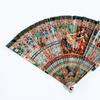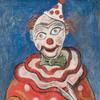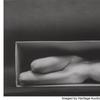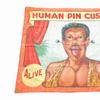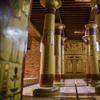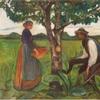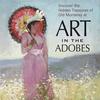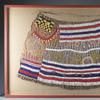A Look Back at 2020 - ARTFIXdaily Returns in January
- December 10, 2020 16:12
Thank you to ARTFIXdaily's readers, advertisers and content providers for keeping the arts engaged throughout the challenges of 2020. Our subscriber e-newsletter will resume in January 2021. Over the holiday break, the ArtGuild platform will remain open for members to post events and press releases to ARTFIXdaily.
Here is a brief overview of art world highs and lows in 2020, with the hope of renewal–reopenings and reimaginings–ahead.
All Eyes: The Getty and Royal Institute for Cultural Heritage enhanced the popular Ghent Altarpiece website Closer to Van Eyck to offer a 100 billion-pixel view of the world-famous altarpiece. To the delight of the homebound multitudes, the newly-restored The Adoration of the Mystic Lamb panel reveals a mesmerizing Lamb's face, described by Smithsonian Magazine as “alarmingly humanoid.”
Lasting Legacies: When New York City and other areas were initially hard hit by covid-19 last spring, a number of prominent art world figures were lost, including American art scholar and author William H. Gerdts, American art specialist and dealer Dr. John Driscoll, and artist and African American art scholar David C. Driskell, among others. Beginning in January 2020, the Palmer Museum of Art at Penn State exhibited 140 American works on paper donated by Dr. Driscoll in 2018. The traveling retrospective “David Driskell: Icons of Nature and History" will debut at the High Museum of Art in February 2021.
A Zoom from the Museum: Museums created Zoom events as well as Zoom backgrounds featuring their collection artworks for quarantined folks working from home on the video platform. Viral social media campaigns entertained enormously during the spring lockdowns around the world, most notably the hilarious posts of people or pets posed as museum masterpieces, still trending on Twitter, Instagram and Facebook with the hashtags #gettymuseumchallenge and #betweenartandquarantine and @tussenkunstenquarantaine. The best of the Getty Museum Challenge posts were made into a book. In just a couple of weeks in April over 40 million people worldwide viewed sunny museum artworks with the hashtag #MuseumSunshine.
OVR Not Over: Online Viewing Rooms (OVR) took over for gallery exhibitions that could not be experienced in person during stay-at-home orders. The format often proved successful for high-end galleries, including Hauser & Wirth with its sold-out exhibition of Rashid Johnson's "Untitled Anxious Red Drawings," last May. According to the UBS Global Art Market Report, gallery online sales were up to 37 percent of total sales volume by mid-2020, well above the 10 percent of sales in the first half of 2019. Yet, the global gallery sector reported overall sales (an estimated $36.8 billion in 2019) were down 36% in the first half of the year.
Online Auctions in Overdrive: Auction houses and bidding platforms also experienced the quick adapation to online buying by a global audience. Even so, a contraction in sales this year due to a lack of live auctions has been expected. Christie’s announced a 25 percent drop in annual sales overall, while 2020 private sales rose considerably to a forecasted total of £987 million ($1.2 billion). Sotheby's moved its marquee auctions to June, producing broadcast sales and related online content. Major houses also mixed categories in marathon sales across cities; a relay of livestreamed sales brought $420 million total in Christie's ONE: A Global Sale of the 20th Century. Mid-sized auction houses notably reported some of their best sales this fall; regional art and design was a draw, for example, with Pennsylvania Impressionists headlining Philadelphia-based Freeman's $5.2 million sale, its best American art sale on record.
Fair Warning: When the spread of covid-19 at TEFAF Maastricht caused the grande dame of art fairs to abruptly shut down in mid-March, digital initiatives became the way to carry on. Some fairs successfully pivoted online with an easy-on-the-attention-span model of one masterwork per exhibitor (TEFAF Online) or just two fresh finds per gallery, notably, shown with prices listed (The American Art Fair). Fair Warning, auctioneers' "last call" phrase for bids, is the name of former Christie’s co-chairman Loic Gouzer's new app that auctions off one single "masterwork" to a list of pre-approved collectors (those with more than fast thumbs, presumably)—a Basquiat brought an in-app sale record of $10.8 million in August.
De-escalating the Deaccessions: Museum "fire sales" that some feared early on in the pandemic did not come to pass even when as many as 30 percent of U.S. museums say that permanent closure may be a possibility due to covid-19 shutdowns. Museum organizations relaxed rules on sales from museum collections in response to pandemic challenges. One big loss was a Helen Frankenthaler painting sold from the Palm Springs Art Museum collection. The Brooklyn Museum raised nearly $20 million for seven works by artists including Henri Matisse, Joan Miró and Claude Monet. A plan to auction off about $65 million of top-tier 20th-century artworks, to fund new acquistions and to help pay museum staff equitable living wages, was scuttled by the Baltimore Museum of Art after an uproar.
Black Art Rises: Black artists took center stage in major museum exhibitions in 2020, among many, the traveling blockbuster Jacob Lawrence: The American Struggle (now at Birmingham Museum of Art, to Feb. 7, 2021); the touring exhibition Hank Willis Thomas: All Things Being Equal... continued at Cincinnati Art Museum (ended Nov. 8); Writing the Future: Basquiat and the Hip-Hop Generation at Museum of Fine Arts, Boston, (to May 16, 2021); and Bisa Butler: Portraits, the first solo museum exhibition of the artist’s work, which debuted at the Katonah Museum of Art and traveled to The Art Institute of Chicago (to January 24, 2021). On the market, several historic works by Black artists ranging from Harlem Renaissance masters Augusta Savage and Charles Alston to prized postwar painters Wadsworth Jarrell and John Robinson brought record prices in a $2.7 million sale on Dec. 10, capping a strong year for Swann's African American art department. At a Phillips auction on Dec. 7 in New York, Amy Sherald's painting The Bathers soared to an artist auction record of $4.6 million, far above its pre-sale estimate of $150,000-$200,000.
Increasingly Indigenous: K Art, the nation's first Native-owned and solely focused art gallery debuted in December; the renaming of Plimoth Patuxet brought awareness to the Massachusetts site's original inhabitants; the Metropolitan Museum of Art appointed Patricia Marroquin Norby (Purépecha) as the museum's inaugural Associate Curator of Native American Art, joining the American Wing department; and the National Gallery of Art acquired I See Red: Target (1992) by Jaune Quick-to-See Smith, the first painting by a Native American artist to enter the collection.
Women's Vote: Falling on a contentious political year that resulted in the election of Kamala Harris as the first female U.S. Vice President, the centennial of the 19th Amendment which granted U.S. women the right to vote was marked by many museums. Among the initiatives, Votes for Women: A Visual History at the Brandywine River Museum of Art; Women of Vision which honored 13 artists at the Farnsworth Art Museum; and Baltimore Museum of Art's 2020 Vision, a year of women-focused exhibitions and programs (and acquisitions). For its Instagram posts often featuring eye-popping data on women in the arts, The National Museum of Women in the Arts (NMWA) won the Webby People’s Voice Award for Best Social Media Account in the Art and Culture category in the 24th Annual Webby Awards. Legislation for a proposed American Women’s History Museum in D.C. was unaminously passed by the House of Representatives in February, but the bill was ultimately defeated on December 10 in the Senate due to the sole objection of Republican Mike Lee of Utah.
Latinx in America: Senator Mike Lee (R-Utah) also put the brakes on a proposed National Museum of the American Latino that had bipartisan support. Long-planned for the Smithsonian Institution portfolio, the Latino Museum and the American Women's History Museum were both blocked (for now) by Lee for inclusion on the National Mall. Earlier in the year, the profound influence of Mexican artists on American art was explored in the acclaimed exhibition Vida Americana: Mexican Muralists Remake American Art, 1925-1945 at the Whitney Museum.
Stamp of Approval: The undulating wire sculptures of California artist Ruth Asawa (1926-2013) were honored with a pane of USPS FOREVER stamps. Her work soared to an artist auction record of $5,382,500 at Christie's in July. Another Japanese-American artist, Isamu Noguchi (d. 1988), became the first Asian-American represented in the U.S. national collection. Popping up in the White House Rose Garden, his 1962 bronze two-part sculpture “Floor Frame” was acquired by the White House Historical Association for $125,000 at Sotheby's in March.
A Walk in the Sculpture Park: Museums and historic sites with art-filled outdoor spaces had an easier time remaining open in some capacity and attracting visitors during pandemic-related shutdowns. In one effort, the three largest museums in the Berkshires of Massachusetts—the Clark Art Institute, MASS MoCA and the Norman Rockwell Museum—launched exhibitions and an art walk with outdoor sculpture installations by artists ranging from Martin Puryear to Louise Bourgeois, dubbed Northern Berkshire Art Outside. Sculptures also came down in parks across the U.S.—namely, Confederate monuments and statues of men with ties to slavery. Following a summer of protests for racial justice, the National Trust for Historic Preservation called for such memorials to be removed from the public space so that the country can "continue building a more perfect union that embodies equality and justice for all."
Blue Chip Blues: New York art dealer Mary Boone was given the privilege of early release from prison due to covid-19 precautions while alleged art scammer Inigo Philbrick was plucked off the Pacific island of Vanuatu by authorities in June to face charges by the United States Government in the Southern District of New York in a more than $20 million fraud case.
Gilt-y in Florida: The in-person extravaganza that is Art Basel Miami Beach was canceled this December, but some of the art establishment still migrated to south Florida. Sotheby's and New York-based mega-galleries Pace and Aquavella set up outposts at Palm Beach's The Royal Poinciana Plaza in early November.
Many Monoliths: Entertaining for 2020 standards, the sudden appearance of a shiny, mysterious monolith in remote Utah public land went viral for its possiblities as a sci-fi prank, alien marker or...art installation (maybe it's a John McCracken!). The Utah monolith was sneakily removed at night by a group of men, with other editions showing up worldwide from California to Finland.
Art New Deal: The U.S. arts sector is still in need of federal stimulus money for galleries (many small to mid-sized) that could not access PPP or other loans, the museums without a stable of donors or huge endowments, the furloughed employees who may not be rehired, and the emerging/mid-career artists whose markets have been stymied by closures.
Future Memorial: To honor victims of covid-19, a “World Memorial to the Pandemic” is one project being planned by Uruguay-based architect Gómez Platero.









